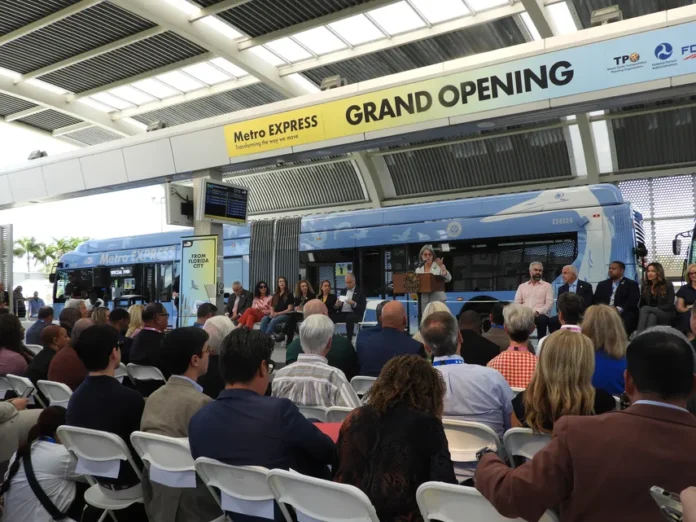In a ceremony that brought together federal, state, and local authorities, Miami-Dade County celebrated this Wednesday the official opening of Metro Express, officially known as South Transit Way, the first all-electric rapid transit system in the US. The system will begin operating next Monday, October 27, connecting Dadeland South with Homestead.
Miami-Dade Mayor Daniella Levine Cava led the event, along with Congressmen Mario Díaz-Balart and Carlos Giménez, County Commission Chairman Anthony Rodríguez, and Department of Transportation and Public Works Director Stacy L. Miller. The event was attended by numerous dignitaries, public officials, project workers, and county residents.
The project, which represented a $300 million investment—supported equally by the federal, state, and local governments—will connect Dadeland South with SW 344th Street in Homestead via a dedicated 20-mile corridor. It is scheduled to open on Monday, October 27, when South County residents will be able to board the new 60-foot articulated electric buses at any of the 14 climate-controlled stations or 32 improved local stops.
“This is the first all-electric bus rapid transit system in the U.S. and the first of its kind in Miami-Dade County,” said Stacy L. Miller, director and CEO of DTPW. “We want South County residents to have a safe, reliable, and modern service that offers a train-like experience, but with the flexibility of a bus system.”
Mayor Levine Cava emphasized that the Metro Express “marks the beginning of a new era in public transportation in Miami-Dade County.”
“This is going to transform the way people travel to work, school, or the doctor,” the mayor declared. “It’s a faster, more comfortable, and more convenient system. We want more people to get on the bus, leave their cars at home, and help reduce traffic.”
The mayor recalled that the project took several years to complete due to the complex coordination between federal, state, and local agencies, as well as the multiple engineering and technical testing requirements involved.
“It was a team effort between all levels of government. We had to raise the funds—$100 million each—and make sure everything worked properly. We’re still in the testing phase, but we’re ready to begin operations,” added Levine Cava.
The Metro Express will have two types of service: an express service, which stops only at the 14 main stations, and a local service, which stops at the 32 secondary stations. During rush hour, buses will run every seven minutes, every 15 minutes during regular hours, and every 30 minutes on weekends.
The system will maintain the regular transit fare of $2.25 and include free transfers to Metrorail in Dadeland South and to local routes. Passengers will be able to pay with contactless cards, mobile devices, or cash at station machines, which have access controlled by turnstiles.






